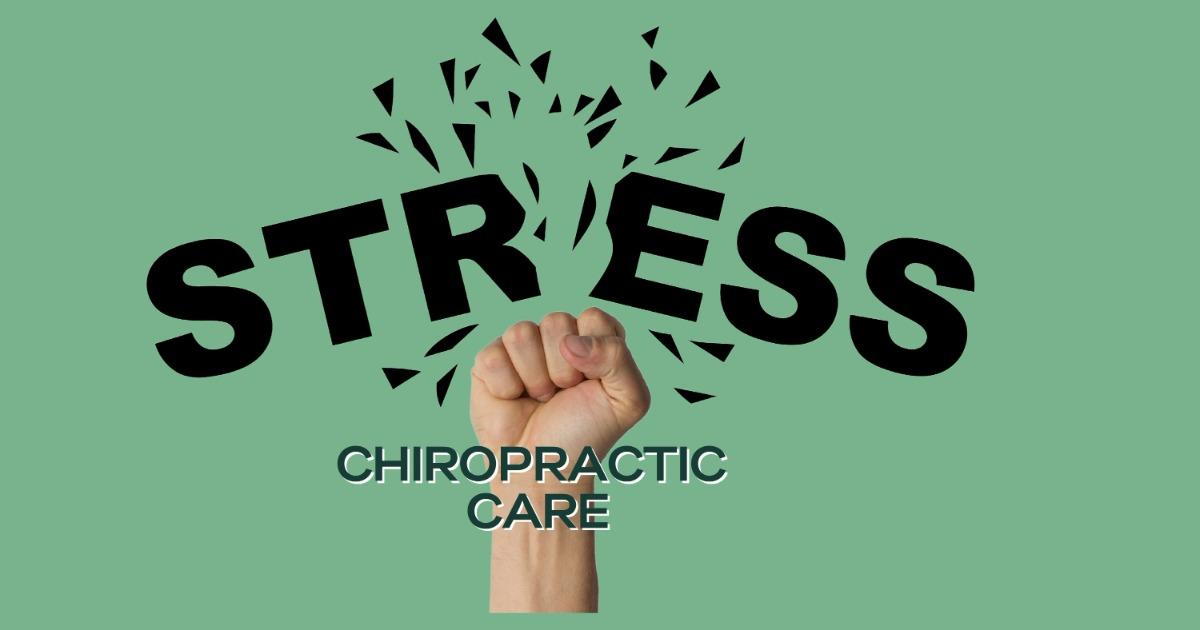A Holistic Approach To Stress

- posted: Oct. 15, 2024
We all experience stress in our lives – it is a natural response to daily challenges and pressures, especially with the holiday season and end of year quickly approaching. But, what happens when it becomes too much and stress starts to impact your physical health, disrupt your sleep, increase your muscle tone, and even starts making the simplest tasks feel overwhelming? As a chiropractor, I see firsthand how stress can manifest in the body and affect overall wellbeing. Chiropractic care is a powerful tool that not only can help with pain management, but also improve the physical symptoms of stress and anxiety, too.
Let’s talk about the role of chiropractic care in stress management, how spinal health impacts mental wellbeing, and the importance of prioritizing your spine to help you find relief and balance in both the body and mind.
Understanding the Physical Impact of Stress and Anxiety
When you experience stress, your body reacts by triggering a “fight or flight” response via the sympathetic nervous system, flooding your nervous system with cortisol and adrenaline, which are stress hormones. While this response is great in short bursts, as it is designed to protect you, chronic stress causes your muscles to tense up, specifically around your neck and shoulders. This tension can thus further lead to poor posture, tension headaches, and even GI issues.
The physical impact does not end there, though. When stress is prolonged, it can throw off your body’s nature balance, affecting your immune system, sleep patterns, and energy levels. You may notice tight muscles, jaw clenching, and increased sensitivity to pain, all of which are signs your nervous system is under strain. These symptoms often go hand in hand with anxiety—a vicious cycle that you must break with targeted intervention.
Chiropractic Care and Stress and Anxiety Management
Chiropractic care focuses on the spine and its impacts on the nervous system, making it uniquely suited to address the physical effects of stress. Here are some ways in which chiropractic adjustments and holistic care can help:
- Spinal Adjustments to Relieve Muscle Tension: Chronic stress can lead to subluxations in the spine, causing pain and restricted movement. Utilizing an adjustment to realign the spine releases tension in the surrounding muscles, allowing your body to relax and function more effectively.
- Supporting Nervous System Function: Your spine is home to the central nervous system, which controls how your body handles stress. Subluxations can disrupt communication between the brain and the body, causing difficulty with stress management. Chiropractic care helps restore proper communication, allowing for a balanced response to stress.
- Activating the Body’s Relaxation Response: In the same way you experience the “flight or fight” response via the sympathetic nervous system triggered by stress, chiropractic adjustments can stimulate the parasympathetic nervous system, which is your body’s natural “rest and digest” mode. This activation can help reduce your heart rate, lower cortisol levels, and promote a sense of calm and relaxation, allowing for better sleep.
More than Just Adjustments: A Holistic Approach
While chiropractic care and spinal adjustments are a great way to reduce stress and combat its physical symptoms, a comprehensive approach is recommended for optimal stress management. This comprehensive approach includes additional therapies and lifestyle recommendations such as:
- Physical Therapy: The relationship between physical therapy and mental health has gained significant attention in recent years. More and more research highlights how physical therapy interventions not only improve physical function, but also play a crucial role in mental health. Chronic pain, physical disability, and injury can have profound psychological impacts, often leading to conditions like depression, anxiety, and traumatic stress. Physical therapists are uniquely positioned to help address both physical and mental health issues, creating a holistic approach to patient care.
- Massage Therapy: Regular massage can help relieve tight muscles, improve circulation, and promote relaxation; thus, making it a great complement to chiropractic care.
- Exercise and Movement: Physical activity increases endorphins, which are your body’s natural stress-relieving chemicals. Walking, yoga, and swimming are great low-impact exercises that keep your muscles flexible and reduce tension.
- Breathing and Mindfulness Practices: Deep breathing and meditation can calm your nervous system, reduce overall stress levels, and impact how your body handles stress.
- Posture and Ergonomics: Poor posture can contribute to back and neck pain. It is important to maintain good posture throughout the day, especially those who sit for long hours, to reduce strain and support your overall spine health.
Take the First Step Towards Stress Relief
While stress is always going to be a part of life, it doesn’t have to control your health. This article should help guide you towards managing the physical effects of stress, supporting your nervous system, and promoting overall wellness in a holistic way. At Schofield Spine + Motion, we’re here to help you achieve a sense of balance and wellbeing in both body and mind. Today is a great day to take the first step on the journey to a healthier, more relaxed you!

Dr. Lauren Block earned advanced credentialing in prenatal care from Palmer College of Chiropractic. She is a member of the International Chiropractic Pediatrics Association and is certified in the Webster Technique which is specifically designed to care for pregnant mothers.

- posted: Oct. 15, 2024
We all experience stress in our lives – it is a natural response to daily challenges and pressures, especially with the holiday season and end of year quickly approaching. But, what happens when it becomes too much and stress starts to impact your physical health, disrupt your sleep, increase your muscle tone, and even starts making the simplest tasks feel overwhelming? As a chiropractor, I see firsthand how stress can manifest in the body and affect overall wellbeing. Chiropractic care is a powerful tool that not only can help with pain management, but also improve the physical symptoms of stress and anxiety, too.
Let’s talk about the role of chiropractic care in stress management, how spinal health impacts mental wellbeing, and the importance of prioritizing your spine to help you find relief and balance in both the body and mind.
Understanding the Physical Impact of Stress and Anxiety
When you experience stress, your body reacts by triggering a “fight or flight” response via the sympathetic nervous system, flooding your nervous system with cortisol and adrenaline, which are stress hormones. While this response is great in short bursts, as it is designed to protect you, chronic stress causes your muscles to tense up, specifically around your neck and shoulders. This tension can thus further lead to poor posture, tension headaches, and even GI issues.
The physical impact does not end there, though. When stress is prolonged, it can throw off your body’s nature balance, affecting your immune system, sleep patterns, and energy levels. You may notice tight muscles, jaw clenching, and increased sensitivity to pain, all of which are signs your nervous system is under strain. These symptoms often go hand in hand with anxiety—a vicious cycle that you must break with targeted intervention.
Chiropractic Care and Stress and Anxiety Management
Chiropractic care focuses on the spine and its impacts on the nervous system, making it uniquely suited to address the physical effects of stress. Here are some ways in which chiropractic adjustments and holistic care can help:
- Spinal Adjustments to Relieve Muscle Tension: Chronic stress can lead to subluxations in the spine, causing pain and restricted movement. Utilizing an adjustment to realign the spine releases tension in the surrounding muscles, allowing your body to relax and function more effectively.
- Supporting Nervous System Function: Your spine is home to the central nervous system, which controls how your body handles stress. Subluxations can disrupt communication between the brain and the body, causing difficulty with stress management. Chiropractic care helps restore proper communication, allowing for a balanced response to stress.
- Activating the Body’s Relaxation Response: In the same way you experience the “flight or fight” response via the sympathetic nervous system triggered by stress, chiropractic adjustments can stimulate the parasympathetic nervous system, which is your body’s natural “rest and digest” mode. This activation can help reduce your heart rate, lower cortisol levels, and promote a sense of calm and relaxation, allowing for better sleep.
More than Just Adjustments: A Holistic Approach
While chiropractic care and spinal adjustments are a great way to reduce stress and combat its physical symptoms, a comprehensive approach is recommended for optimal stress management. This comprehensive approach includes additional therapies and lifestyle recommendations such as:
- Physical Therapy: The relationship between physical therapy and mental health has gained significant attention in recent years. More and more research highlights how physical therapy interventions not only improve physical function, but also play a crucial role in mental health. Chronic pain, physical disability, and injury can have profound psychological impacts, often leading to conditions like depression, anxiety, and traumatic stress. Physical therapists are uniquely positioned to help address both physical and mental health issues, creating a holistic approach to patient care.
- Massage Therapy: Regular massage can help relieve tight muscles, improve circulation, and promote relaxation; thus, making it a great complement to chiropractic care.
- Exercise and Movement: Physical activity increases endorphins, which are your body’s natural stress-relieving chemicals. Walking, yoga, and swimming are great low-impact exercises that keep your muscles flexible and reduce tension.
- Breathing and Mindfulness Practices: Deep breathing and meditation can calm your nervous system, reduce overall stress levels, and impact how your body handles stress.
- Posture and Ergonomics: Poor posture can contribute to back and neck pain. It is important to maintain good posture throughout the day, especially those who sit for long hours, to reduce strain and support your overall spine health.
Take the First Step Towards Stress Relief
While stress is always going to be a part of life, it doesn’t have to control your health. This article should help guide you towards managing the physical effects of stress, supporting your nervous system, and promoting overall wellness in a holistic way. At Schofield Spine + Motion, we’re here to help you achieve a sense of balance and wellbeing in both body and mind. Today is a great day to take the first step on the journey to a healthier, more relaxed you!

Dr. Lauren Block earned advanced credentialing in prenatal care from Palmer College of Chiropractic. She is a member of the International Chiropractic Pediatrics Association and is certified in the Webster Technique which is specifically designed to care for pregnant mothers.
1001 Hudson Rd., Ste. A
Cedar Falls, IA, 50613
